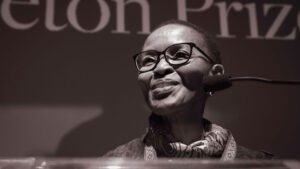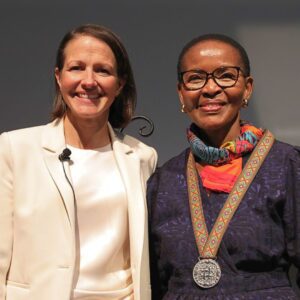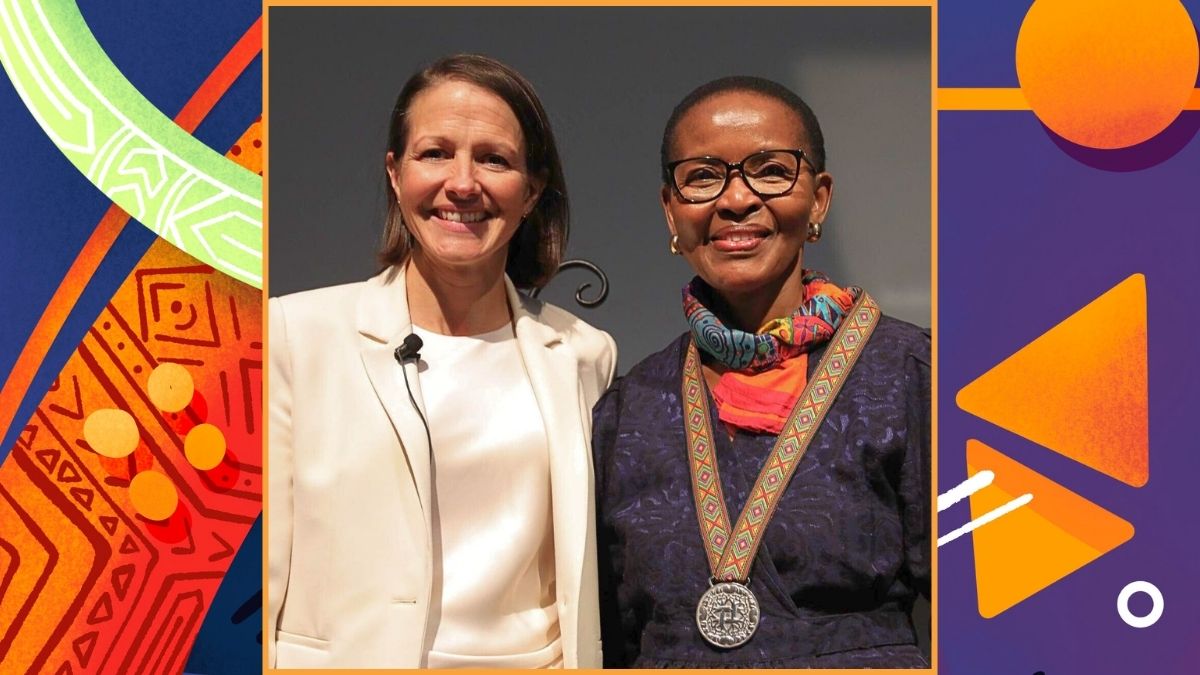On September 23, 2024, at the Stanley H. Kaplan Penthouse in New York, Dr. Pumla Gobodo-Madikizela was formally awarded the 2024 Templeton Prize in recognition of her groundbreaking insights into the mechanisms of trauma and forgiveness.

Photo taken at the Stanley H. Kaplan Penthouse in New York on September 23, 2024. Credit: David-Georges Renaud
Gobodo-Madikizela was announced the winner of the Templeton Prize on June 4, 2024. One of the world’s largest annual individual awards, the Templeton Prize is valued at £1.1 million sterling. The Prize honors those who harness the power of the sciences to explore the deepest questions of the universe and humanity’s place and purpose within it.
Gobodo-Madikizela is a professor and South African National Research Foundation’s Chair in Violent Histories and Transgenerational Trauma and the Director of the Centre for the Study of the Afterlife of Violence and the Reparative Quest at Stellenbosch University. Her insights into the phenomena of trauma and forgiveness in post-apartheid South Africa have created a globally recognized model for social healing in the aftermath of conflict, a model she calls “the reparative quest.”
She was an influential member of the Human Rights Violations Committee of South Africa’s Truth and Reconciliation Commission, which aimed to address the injustices of apartheid. Her award-winning 2003 book A Human Being Died That Night recounts her conversations with the former commander of state-sanctioned death squads, Eugene de Kock, and argues for the possibility of remorse, forgiveness, and reconciliation.

Photo taken at the Stanley H. Kaplan Penthouse in New York on September 23, 2024. Credit: David-Georges Renaud
The evening began with a warm welcome from Heather Templeton Dill, President of the John Templeton Foundation.
“Pumla writes in A Human Being Died That Night that her life, like that of every Black South African, “was shaped by the violence and memories of apartheid.” In this way, Pumla has her own stories to tell, her own personal experiences to interrogate. But her life work also brought her face to face with the experiences of others – those who experienced trauma, those who perpetrated trauma and those who found a way to forgive, to reconcile and to move slowly past the pain.
These are remarkable and utterly transformative stories that raise questions, which Pumla has shown, can be explored through serious academic research. It was never enough for Pumla to accept forgiveness as a profound act of grace and mercy. Instead, she wanted to understand. What does it mean for someone to express regret? How do we judge the genuineness of remorse? What enables some victims to forgive? What distinguishes those who forgive from those who feel unable to do so?”
A moving musical performance of “What a Wonderful World” was performed by the Joelle Lurie Band, followed by dinner and an introduction of the Templeton Prize Laureate by Dill.
Two esteemed colleagues of Gobodo-Madikizela offered words of congratulations: Professor Wim de Villiers, Vice-Chancellor of Stellenbosch University, and Professor Anthony Leysens, Dean of Arts and Social Sciences at Stellenbosch University.
A video presentation of “The Reparative Quest” offered a closer look into Gobodo-Madikizela’s lifelong dedication to healing, reconciliation, and a deeper understanding of human interconnectedness.
After the video, the audience greeted Gobodo-Madikizela with a standing ovation as she joined Dill on stage. Then, she was awarded the customary Templeton Prize medal and scroll. The medal features the iconic Tree of Life motif, and the scroll is a personalized work of art designed for each laureate.
Upon accepting the award, Gobodo-Madikizela delivered her remarks. She reflected on love as a foundation for healing, the purpose of the Truth and Reconciliation Commission, and what humanity can learn from the concept of Ubuntu.
“Ubuntu is best captured in my language, isiXhosa, in the expression Umntu ngumntu ngabanye abantu. A close translation of the meaning of this expression is that ‘A person is a person through being witnessed by, and engaging in reciprocal witnessing of other persons,’ or ‘A person becomes a human being through the multiplicity of relationships with others.’
In other words, the richness of subjectivity flows from interconnectedness with the wider community, and from the reciprocal caring and complementarity of human relationships. It is a reciprocity that calls on people to be ethical subjects, able to see others as part of a human community.”
Gobodo-Madikizela’s speech received a second standing ovation.
The evening concluded with a musical performance of “Gratitude,” written and arranged by Brandon Lake and performed by the Joelle Lurie Band.
